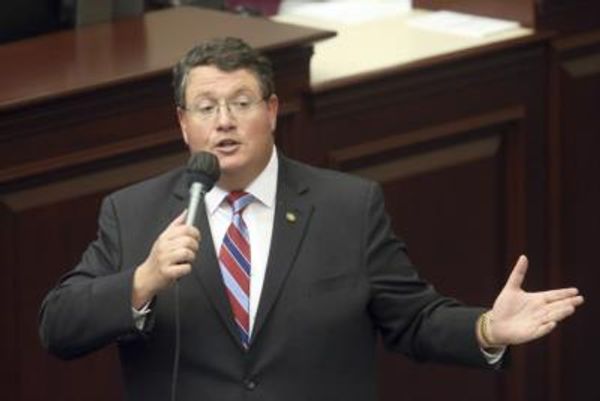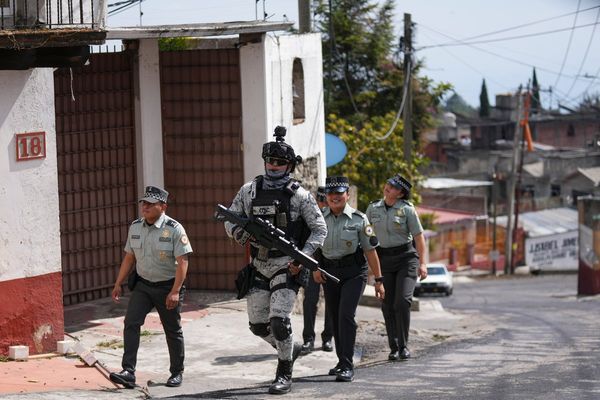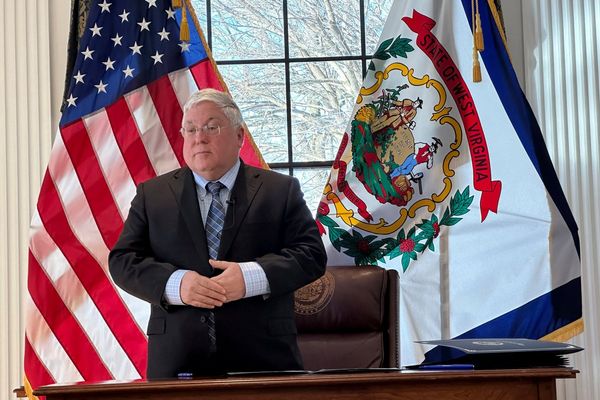ST. LOUIS — Patrick Stanley has high hopes for this summer.
The pandemic is receding. Business is returning to his Washington Avenue cigar lounge. And next month he’s set to open three new businesses across the street.
There are just a few problems: The speeding cars, late-night noise and general mayhem that plagued downtown last summer are also back, and Stanley worries they’re going to scare off suburbanites and hamstring the recovery.
“I’m committed to this city, and we’re expanding,” he said between cigar puffs last week. “But we’ve got to get this fixed.”
The need for improvement reentered the spotlight recently when revelers kicked out of an apartment building in the city’s Washington Avenue entertainment district decided to make the roof of a squad car their new dance floor. Video of the early episode on May 23 went viral and Mayor Tishaura O. Jones promised consequences for the offending twerkers.
But it will almost certainly take more than a stern warning to prevent similar behavior in the coming months, and business owners and residents say they can’t afford another summer like the last one, when crime surged to an alarming degree.
Episodes of violent crime spiked in June and July, reaching record or near-record levels amid the pandemic and civil unrest following the police killing of a Black man in Minneapolis. In June alone, police logged 114 assaults downtown, higher than the last eight Junes combined for the area. And there were more robberies in June and July downtown than any of the 16 years that St. Louis crime has been categorized by neighborhood. All of this came as homicides citywide soared.
Concerns over crime and late-night rowdiness have come to a head roughly every few years in the past decade.
After the summer of 2010 saw a spate of shootings near Sugar Lounge, Lure and Club 15, liquor control officers met with club owners and tried to yank Lure’s license. Later that year, officials called for increased police patrols, video surveillance, a curfew and restrictions on underage patrons after another shooting.
Two years later, a beefed-up police presence was enforcing a curfew and closing streets following complaints about cursing and teenagers loitering and heckling patrons.
In 2016, Mayor Francis Slay and downtown leaders again promised an increase in patrols in a show of strength by police after the death of a 21-year-old during a carjacking on Washington Avenue, and last year Mayor Lyda Krewson reintroduced roadblocks and closed the Eads Bridge after a deadly crash.
But this time around, downtown may need to really move the needle: the area is straining to fill storefronts vacated amid a once-in-a-generation pandemic. Boosters worry continued lawlessness could soon cost the area residents, too.
“People are losing their ability to use their balconies after nightfall,” said Brad Waldrop, a downtown developer with property on Washington Avenue. “They’re losing the ability to go on the street without worrying about getting hit.”
Michael Qualizza, one of the owners at The Last Hotel at the corner of Washington and 15th Street, says he sees it — and hears it — on both fronts when he sleeps in the hotel. Revelers drive down Washington, stereos blaring.
“We have people coming through with sound systems that cost probably $50,000 to $60,000 that just rock these buildings,” he said. “You’ll feel it in your teeth.”
So far the response from City Hall is familiar, but business owners say it’s coming earlier than it has in the past.
Jones, who promised to “transform” the city’s approach to public safety in her inaugural speech in April, said last week she’d deploy additional patrols over Memorial Day weekend, including a “summer cruising detail” working from 7 p.m. to 3 a.m. to enforce traffic laws, redirect traffic and block off streets where necessary.
Public Safety Director Dan Isom told the Post-Dispatch that the city is also looking at blocking some routes into downtown from Illinois again this summer, including Eads Bridge. He’s also encouraging law enforcement to use social media to keep an eye on late-night parties that could become a problem.
“We want to separate those who are just enjoying themselves from those who want to cause problems,” Isom said. “We hope you park and walk around and enjoy the bars and the restaurants and the scenery. But it’s not designed for large groups of people to just sort of cruise around all night.”
Jones’ plans also call for liquor-control and building-code officers to watch for violations during the holiday weekend.
All of that sounds good to business owners.
If the city can deliver on traffic enforcement alone, Qualizza said, it would be a marked improvement.
“Right now, you can do a wheelie down Washington Avenue at 100 mph and no one will pull you over,” he said.
Members of the Downtown Neighborhood Association are also calling for scrutiny of Reign Restaurant on Washington between Tucker Boulevard and 10th Street. The city shut down Reign multiple times for violations of COVID-19 restrictions, including once after four were shot outside the venue.
Waldrop said it now effectively operates as a nightclub and concert venue.
“And you invite hundreds of people to drive in here and then leave after drinking, you get this cruising, the burnouts, the drag racing,” he said.
Dana Kelly, a financial adviser who owns Reign, called the accusations “completely untrue” and said she’s doing everything she can to keep her area of Washington Avenue safe, including hiring security officers.
“No liquor license holder wants mania downtown,” she said. “It’s bad for business.”
She also noted that she’s only been open since last year, and late-night issues downtown have plenty of precedent.
At least on that point, she and the neighborhood agree. No matter what happens in the coming months, residents and property owners say they need long-term solutions.
“This happens every year to some extent, and the response is always reactive,” said Dan Pistor, who lives at Washington and 10th Street and chairs the association’s safety committee. “The city doesn’t really do anything until problems develop.”
At a Downtown Neighborhood Association meeting Wednesday, members talked of the need to reimagine the city’s approach to liquor licensing, short-term rentals like the one that hosted the previous weekend’s party, and the wide-open streets built for a different era.
Newly elected Alderman James Page, whose ward includes part of downtown, said he’s looking into different ideas on the alcohol-fueled issues, including a temporary ban on some new liquor licenses.
“I don’t want to sound like a prohibitionist by any means,” he said, “but a lot of the issues that we’re facing, you can find the root of them in alcohol served to underage people and in illegal establishments.”
He said he’s also exploring the idea of requiring new bars and restaurants to make at least half of their money from food — a shot at making businesses that say they’re restaurants act like it.
Waldrop, the developer, said the city could take on party Airbnbs by requiring hosts to live in the unit they’re renting. He said he’d also like to see the city revisit ideas about adding green space and street dining areas to Washington Avenue, which narrow the streets for cruisers and make them friendlier to pedestrians.
Pistor, the neighborhood association committee chair, said the organization is meeting with the mayor in the coming days.
City Hall says it’s all ears.
“Collecting feedback directly from residents is a priority of Mayor Jones, in order to ensure longer-term plans adequately address their ongoing safety concerns,” a news release the city issued recently said.
Some residents are also looking for more help from the Downtown community improvement district and its $3 million annual budget.
The district, which collects an additional property tax to supplement services downtown, is seeking signatures to reauthorize its existence past the end of the year. An opposition group calling itself Citizens for a Greater Downtown St. Louis has been urging property owners to reject the extension and put it in charge of a new organization.
Les Sterman, a retired regional planning official serving on the opposition group’s board, said current district leadership hasn’t done nearly enough to slow rising crime, enforce traffic laws, keep the area clean or take on unscrupulous landlords.
Current leaders have disputed that assertion.
When asked about the district’s plans for this summer, Executive Director Kelli McCrary sent links to the CID’s website describing how it pays for St. Louis police’s downtown-area bike unit, secondary patrols by off-duty officers and street cleaning service, among other things.
Meanwhile, Michaela Hogue said she still feels safe in her Washington Avenue apartment and at work at Rosalita’s Cantina on Washington Avenue.
But she’s been a little nervous seeing the cruising and street partying get an early start this year. She worries what July will be like if nothing is done.
Jones’ announcement of increased patrols buoyed her spirits, though.
“Hopefully they’ll scare off some of the problem,” Hogue said. “New leadership may make a difference. I’m hopeful.”
Stanley, the cigar lounge owner, said he is, too.
As he walked through an empty storefront he plans to turn into a wedding venue, he proudly pointed out original 19th century floors and imagined what the old garment warehouse will look like all cleaned up.
“It’s gonna be nice,” he said. “But we gotta take care of this stuff first.”
———
(Kim Bell and Rachel Rice of the St. Louis Post-Dispatch contributed to this report.)







